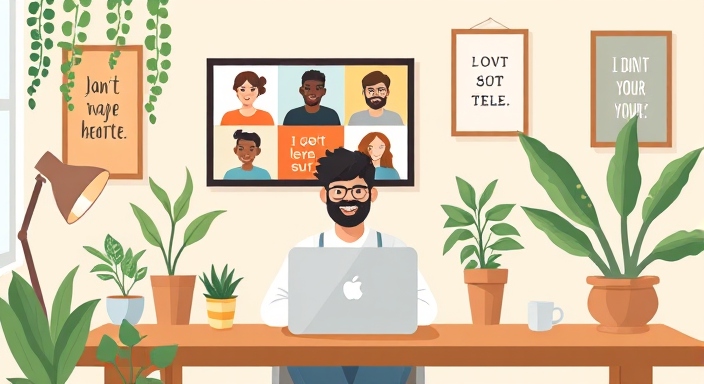
Introduction
Remote work has revolutionized the way software engineers contribute to projects, offering flexibility and productivity. However, the absence of regular face-to-face interactions can lead to feelings of isolation and loneliness. For software engineers, who often work independently or in siloed teams, this challenge can compound over time.
Understanding the root causes of loneliness and implementing practical solutions is essential to thriving in a remote work environment. This comprehensive guide provides strategies to foster social connections, maintain emotional well-being, and create a supportive virtual workspace.
1. Recognizing the Emotional Toll of Loneliness
The Psychological Impact
Loneliness is more than just a feeling—it has measurable effects on mental and physical health. Research shows that chronic loneliness can lead to reduced cognitive function, lower job satisfaction, and increased stress. For remote engineers, this can manifest as:
- Feeling disconnected from the team.
- Reduced engagement in collaborative tasks.
- Lack of enthusiasm for coding or problem-solving tasks.
Self-Diagnosing Loneliness
Ask yourself the following:
- Do I feel left out of team discussions or decisions?
- Am I missing opportunities for professional collaboration?
- Do I lack motivation or energy to complete tasks?
Real-Life Example
A backend developer working remotely for a global tech firm experienced a lack of connection with their team. Recognizing this early, they took steps to improve communication and re-establish engagement with their colleagues.
2. Proactive Steps to Build Virtual Relationships
Why Virtual Connections Matter
While physical proximity fosters natural bonding, remote workers can still build meaningful relationships through intentional efforts.
Actionable Tips
- Regular Team Huddles: Suggest daily 15-minute stand-ups to stay aligned and connected.
- Slack and Discord Communities: Join channels related to your tech stack (e.g., Python, Kubernetes) to connect with like-minded professionals.
- Online Mentorship Platforms: Use platforms like ADPList or MentorCruise to find or become a mentor.
- Collaborative Coding Platforms: Engage in paired programming or collaborative problem-solving sessions.
Real-Life Example
An engineer joined an open-source project on GitHub, interacting with a global community of developers. This not only improved their coding skills but also provided a sense of community and belonging.
3. Socializing Beyond Work: Creating Balance
Importance of Non-Work Interaction
Social connections outside work help remote engineers recharge, gain perspective, and build emotional resilience.
Ideas to Stay Connected
- Virtual Hangouts: Host biweekly game nights or trivia with your team via Zoom or GatherTown.
- Hobby-Based Groups: Join online communities for shared interests, such as art, music, or fitness.
- Local Meetups: Participate in local developer meetups or hackathons when feasible.
Real-Life Example
A senior engineer struggling with isolation organized a virtual chess tournament within their team. The activity fostered camaraderie and helped break the monotony of work discussions.
4. Prioritize Mental and Physical Health
Why Wellness Matters
Maintaining mental and physical health reduces the risk of burnout and helps mitigate feelings of loneliness.
Strategies for Wellness
- Daily Physical Activity: Schedule 30 minutes for exercise, such as yoga, walking, or cycling.
- Mindfulness Practices: Apps like Calm or Headspace can help you unwind after a long coding session.
- Healthy Eating: Prepare balanced meals to avoid the temptation of unhealthy snacking.
- Seek Therapy: Platforms like BetterHelp offer remote therapy sessions tailored to professionals.
Real-Life Example
A remote software engineer began integrating mindfulness practices into their daily routine, resulting in improved focus and reduced stress levels.
5. Leverage Technology to Stay Connected
Tools to Combat Loneliness
Technology bridges the gap between remote workers and their teams. Using the right tools ensures communication remains seamless and engaging.
- Asynchronous Communication: Tools like Loom or Slack keep you connected without adding pressure.
- Video Calls Over Chat: Whenever possible, opt for face-to-face video calls to foster connection.
- Team Collaboration Tools: Use Figma, Trello, or Miro to work on shared projects and feel part of a team.
Real-Life Example
A team of software engineers introduced monthly “Demo Days” on Zoom to showcase personal projects, fostering interaction and peer learning.
6. Build a Supportive Routine
Create a Structure That Works
Loneliness often stems from a lack of routine. Developing habits can bring a sense of normalcy and purpose to your day.
Tips for a Supportive Routine
- Morning Rituals: Start your day with a consistent routine, like journaling or exercise.
- Set Boundaries: Maintain clear work hours and disconnect after your shift ends.
- Reflect and Plan: Use a tool like Notion to set weekly goals and track accomplishments.
Real-Life Example
A full-stack engineer created a “work day wrap-up” ritual, reflecting on wins and planning for the next day. This helped separate work from personal life, reducing stress.
7. Seek Professional Support
Know When to Ask for Help
If loneliness persists despite your best efforts, consulting a professional can help.
Available Resources
- Employee Assistance Programs (EAPs): Check if your company offers mental health support.
- Online Therapy Services: Platforms like Talkspace and BetterHelp provide remote access to licensed counselors.
- Local Support Groups: Many cities have remote worker meetups or mental health groups.
Real-Life Example
A software engineer who felt overwhelmed during the pandemic sought therapy through their company’s EAP. The sessions helped them develop coping strategies and regain focus.
Conclusion
Managing loneliness as a remote software engineer requires proactive steps to build connections, maintain a routine, and prioritize emotional well-being. By leveraging technology, fostering social connections, and seeking support when needed, you can not only combat loneliness but also excel in your career.
External References
- Focusmate – Virtual coworking tool for staying engaged.
- BetterHelp – Remote therapy for mental health support.
- Slack Communities – Collaboration and networking groups for developers.